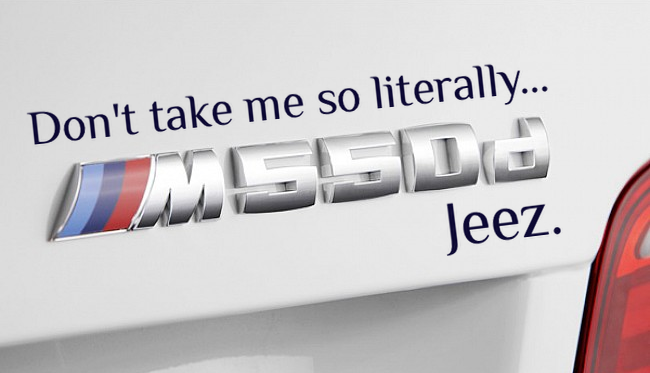By Peter D
On Friday I talked about two of the most egregious offenses to naming in recent automotive history, MyFord Touch 2.0 and the BMW M550d, so for this morning’s Philosophy of Driving, I’m going to explore another aspect of this discussion, and in doing do, parry my previous position.
I previously, and cynically, argued that the German Horsepower Wars had (d)evolved into the German Naming Wars, with the greatest honour going to he with the greatest discrepancy between real and claimed specific output. I then went on to pick apart, quite pedantically, the “2.0” attached to the new MFT software update. It was all very anal.
But it was hardly a new and refreshing perspective. We love this kind of stuff. We love to to groan about trivial discrepancies. Nothing gets us riled up like lap times, torque figures, and claimed displacement. We live in the scientific era, after all, and precision is King. If we can’t figure out something with absolute certainty, down to the last micrometer and millisecond, it’s probably because we aren’t using sufficiently sensitive instruments. This is the way of science.
This is not, however, the way of our pre-scientific ancestors.
The pre-scientific life basked in poetry, allegory, and open-minded interpretation. There was debate, discussion, weighing of opinions, etc. Nothing was certain, everything was subjective, and agreement was seen as a failure to thoroughly explore a subject matter.
In the scientific era, since we believe in this nonsensical thing called Objectivity, we believe that there is one true way in which the world works. There’s one mechanism, our theory supposes, and if we could just figure out how it worked, we could solve all the resulting problems. Our modern brain refuses to believe that there’s anything we can’t know. There’s nothing too complex for us to understand. And since there’s only one Truth, calling a 3.0L engine “5.0” is like calling an apple an orange. This gets us in a big huff.
This single-mindedness is assuredly not how religious texts, like the Torah for example, were written. Nor, in the pre-scientific era, was the precision of science even desirable.
“Who says that there’s only one answer?”, the Torah asks.
If one account says that the Israelites were in Egypt for 400 years and another account says that we were in Egypt for 430 years, the modern thinker asks “Well which is it? How long were the Israelites in Egypt for, 400 or 430 years?”.
The Torah bypasses the question, failing to see its relevance, and responds with “It’s both”, which is to say that it was a really, really long time. For our ancestors, precision wasn’t that important. Ideas were valued instead.
Lost like Moses.
There’s an appeal to this pre-scientific logic (even though calling it “logic” is curious). The inherent vagueness and openness to interpretation – the utter lack of absoluteness – is empowering and engaging, if a bit unnerving. Rather than being told the answer, we’re asked to find it for ourselves.
This openness is not only foreign in the scientific era, but feared as well. We’re now taught a form of intellectual xenophobia that presupposes science’s all-knowing, all-conquering ability. We dismiss lateral thinking as aimless wandering, like Moses in the desert.
But the freedom and ability to explore ideas is crucial in a complex society, proportionately so as complexity increases. Today, our society is so unknowably complex that the thinking skills cherished by our ancestors are more relevant than ever. Besides, if we need absolute precision, we have machines that can do that far better than we.
There’s an understandable amount of concern regarding the future of our modern economy, particularly in the face of fragile mega-banks and lumbering governments marred by debt with oh so many zeros. The next phase of our global economic evolution will require the creativity and openness taught in scriptures like the Torah. Not in taking these scriptures literally, but in the style of learning they expound.
Studying and exploring these ancient ways of thinking and familiarizing ourselves with our ancestral ways of thinking has never been more appropriate. These texts weren’t written in a concrete manner, nor were they meant to be interpreted as such. If we can rejuvenate that notion, that there’s more than one correct solution but that we can’t know until we try, we could foster the creativity, ingenuity, and entrepreneurship our economy so desperately needs going forward.
So pick up the Hindu Bhagavad Gita, pick up the Muslim Koran, and pick up the Buddhist Dhammapada. Challenge your own ideas and grow from it.
Ford and BMW are already on it. Why aren’t you?
And that’s the Philosophy of Driving for this week. See you next Monday morning!
[Image credits: BMW, one big photo]


